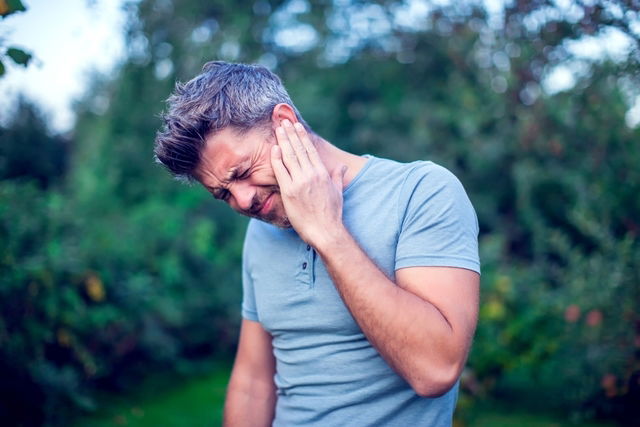Earache remedies, like using a stick of ginger or applying a warm compress, can help to relieve discomfort, as these remedies contain substances with analgesic and anti-inflammatory properties.
Earaches can be caused by the presence of water in the ear canal, infections or inflammations, or a ruptured eardrum. These conditions can present with other additional symptoms, like ear discharge, fever and dizziness. Learn more about what can cause ear pain.
These home remedies are a great way to relieve pain earaches, however if your symptoms do not improve in 2 days or if your earaches present with other symptoms, you should see an ENT specialist for assessment and treatment as necessary.

Home remedies for earaches
Remedies for earaches include:
1. Warm water compress
One of the best home remedies for an earache is to apply a warm water compress over the affected ear. The heat can help to boost circulation within the ear and decongest it, which reduces pain.
Ingredients
- Water
- A soft cloth, sterile gauze, cotton or hot water bottle
How to prepare
Boil the water in a pot, and then remove from heat and allow to cool slightly. Check the water to make sure it will not burn the skin. Then soak the cloth (or other material) and squeeze out the excess water. Place this cloth over the affected ear for 5 to 10 minutes.
If using a hot water bottle, pour the water into the bottle, and cover with a towel. Then apply over the affected ear.
2. Ginger stick
Ginger is a root that contains phenolic compounds, like gingerol, chagaol and zingerone. It contains anti-inflammatory and analgesic properties which help to combat inflammation and relieve various types of pain, including earaches.
Learn more about the health benefits that ginger can offer.
Ingredients
- 1 tooth-pick thin stick of ginger, about 2 cm long
How to prepare
Make small lengthwise incisions in the ginger stick, then place in the ear for 10 minutes.
3. Chamomile vapor inhalation
A chamomile inhalation is a great earache remedy, as it has a strong relaxing and decongestant effect. It helps with the elimination of nose and ear discharge, which reduces pressures and relieves pain. This vapo can also help to warm up and hydrate the canals that connect the nose to the ear, decreasing irritation that may be causing pain. This inhalation can be cone in adults or children.
Children performing inhalations should be supervised by an adult, as the inhalation can be dangerous and cause a severe burn.
Ingredients
- 6 teaspoons of dried chamomile flowers
- 1.5 to 2 liters of water
How to prepare
Boil the water and add the chamomile flowers. Steep for 5 to 10 minutes. Place your face over the pot and cover the back of your head with a towel to capture more steam. Inhale the vapor, being sure to breathe as deep as possible, for 10 minutes. Repeat 2 to 3 times per day.
Another option is to use chamomile essential oil, by placing a few drops of the oil in the pot with hot water instead of the flowers.
Read more about how chamomile and chamomile tea can be used to improve your wellbeing.
4. Garlic oil
Garlic contains analgesic, anti-inflammatory and antibiotic properties as well as allicin, which is why it can be used to relieve various types of body aches, including earaches.
It is very important to highlight, however, that placing hot oil or any other hot solution in the ear with your ENT’s approval first should be done with extreme caution. The hot oil can worsen pain and burn the inner ear skin.
Ingredients
- 1 clove of garlic
- 2 tablespoons of sesame oil or olive oil
How to prepare
Smash the clove of garlic and place it in a clean and dry bowl. Add the oil and place the mixture in the microwave for 2 to 3 minutes. Then strain and wait for it to cool. Soak a cotton ball or gauze square in the oil, and place in the ear. Another drop is to place 2 to 3 drops of the garlic oil in the affected ear.
It is important to ensure the oil is only warm to prevent inner ear burns. Be sure to check the temperature by placing some oil on the back of your hand.
Garlic oil should not be used for cases of suspected outer ear infections or ruptured eardrums.
5. Mallow infusion
A mallow infusion is rich in phenolic and flavonoid compounds, which contain antioxidant, antimicrobial, anti-inflammatory properties. These can help to relieve earaches and nasal congestion which may be contributing to pressure and pain within the ear.
Ingredients
- 3 tablespoons of dried mallow flowers
- 1 liter of water
How to prepare
Boil the water, remove from heat and add the dried flowers. Allow to steep for 10 minutes. Then strain, wait for it to cool and drink up to 3 times per day, or as directed by a doctor or medicinal plant specialist. For children over 7, you can offer up to 75 ml of mallow tea per day.
Mallow tea should not be taken during pregnancy or when breastfeeding. It should also be avoided by those with high blood pressure.
6. Echinacea tea
Echinacea tea is rich in antioxidant, anti-inflammatory and immunostimulating substances, like flavonoids, chicoric acids and rosmarinic. These help to boost immunity and decrease the production of substances that may cause earaches.
Ingredients
- 1 teaspoon of echinacea roots or leaves
- 1 cup of boiling water
How to prepare
Add the leaves to the cup of water and allow to steep for 5 to 10 minutes. If using roots, boil the roots together with the water for 10 to 15 minutes. Then strain the infusion, wait for it to cool and drink twice a day.
Echinacea tea should not be used by children, pregnant women or breastfeeding women. It is also not indicated for people with tuberculosis or autoimmune diseases (like rheumatoid arthritis, lupus or psoriasis).
When to see a doctor
Earaches can often be relieved with simple measures and improve within 2 to 3 days. However, you should see a doctor if you notice any of the following:
- Intense earaches
- Pain that worsens or persists for over 2 days
- Pus or discharge from the ear
- Decreased hearing
- Difficulty opening your mouth
- Fever
- Headaches
- Dizziness
- Vertigo
- Ringing in the ear
The doctor will assess the ear with an otoscope, and assess its presentation and your symptoms to evaluate the possibility of an ear infection or if the eardrum is compromised.
This evaluation will also help to identify whether there is discharge or other complications to determine the best treatment approach. The doctor may prescribe anti-inflammatories, analgesics or antibiotics.
Check out other natural remedies for ear pain relief that you can try at home.
